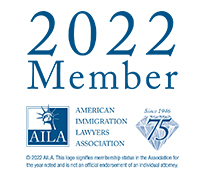Improving Your Life Through Immigration Since 1974
Articles
This page contains articles I have written on immigration-related themes and other articles of interest
Home > Information Bank > Articles
SPOUSAL SPONSORSHIP CANADA
by Andy J. SemotiukU.S. and Canadian Immigration Lawyer
How do I sponsor a spouse, common-law or conjugal partner, or dependent child living outside of Canada?
You may be eligible to sponsor a spouse or a common-law or conjugal partner or dependent children living outside of Canada if:
You must provide financial support for the relatives or family members you are sponsoring depending on their age and relationship to you. If you are sponsoring:
You can sponsor a person as your common-law partner if:
If this process is successful an immigrant visa will be approved. A Right of Permanent Residence Fee must be paid for every person 19 years of age or older for the visa to be issued. The sponsored person must come to Canada before the visa expires.
If a family class application is refused, you have the right to appeal. All immigration appeals are handled by the Immigration Appeal Division of the Immigration and Refugee Board (IRB).
Contact me if you would like assistance with your case. You can reach me at Andy@myworkvisa.com or you can call me at my law firm details of which are on this web site.
Documents on the topic of cross border wedding or marriage problems:
You may be eligible to sponsor a spouse or a common-law or conjugal partner or dependent children living outside of Canada if:
- The person you want to sponsor is a member of the family class; if he or she is not, you will be found not to be a sponsor,
- You are 18 years of age or older,
- You are a Canadian citizen or permanent resident,
- You reside in Canada,
Note: Canadian citizens not residing in Canada may sponsor their spouse, common-law or conjugal partner and/or dependent children who have no dependent children of their own. They must satisfy immigration officials that they will reside in Canada at the time their sponsored spouse, common law or conjugal partner and/or children become permanent residents of Canada. Canadians traveling abroad as tourists are not considered to be residing outside Canada.
Sponsors must provide evidence that they will reside in Canada at the time their sponsored spouse, common-law or conjugal partner and/or children become permanent residents of Canada. Evidence that they will reside in Canada may include one or more of the following:
- Letter from an employer;
- Letter of acceptance to a Canadian educational institution;
- Proof of having rented/bought a dwelling in Canada;
- Reasonable plans for re-establishing in Canada or severing ties to the other country.
- You sign an undertaking promising to provide for the basic requirements of the person being sponsored and, if applicable, his or her dependent children, and
- You and the person being sponsored sign an agreement that confirms that each of you understands your mutual obligations and responsibilities.
You must provide financial support for the relatives or family members you are sponsoring depending on their age and relationship to you. If you are sponsoring:
- Your spouse, common-law partner or conjugal partner: you must provide financial support for three years from the date that person became a permanent resident;
- Your, or your spouse's, common-law or conjugal partner's dependent child who is less than 22 years of age: you must provide financial support for 10 years from the date that person became a permanent resident or until the child turns 25 years of age, whichever comes first;
- Your, or your spouse's, common-law or conjugal partner's dependent child who is 22 years of age or older: you must provide financial support for three years from the date that person became a permanent resident.
You can sponsor a person as your common-law partner if:
- That person is of the opposite or same sex,
- You and that other person have cohabited in a conjugal relationship for a period of at least one year, and
- Your relationship with that person is continuing, even though you are temporarily living apart.
- Common-law partners but cannot meet the definition, that is were not able to live together continuously for one year with their sponsor, or
- Spouses, but marriage to their sponsor is usually not an available option to them, usually because of marital status or sexual orientation, combined with an immigration barrier (for example, rules preventing partner and sponsor of long stays in one another’s countries).
If this process is successful an immigrant visa will be approved. A Right of Permanent Residence Fee must be paid for every person 19 years of age or older for the visa to be issued. The sponsored person must come to Canada before the visa expires.
If a family class application is refused, you have the right to appeal. All immigration appeals are handled by the Immigration Appeal Division of the Immigration and Refugee Board (IRB).
Contact me if you would like assistance with your case. You can reach me at Andy@myworkvisa.com or you can call me at my law firm details of which are on this web site.
Documents on the topic of cross border wedding or marriage problems:






